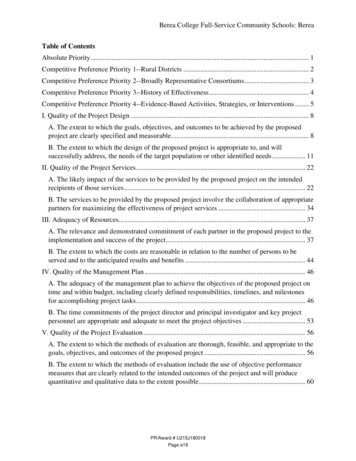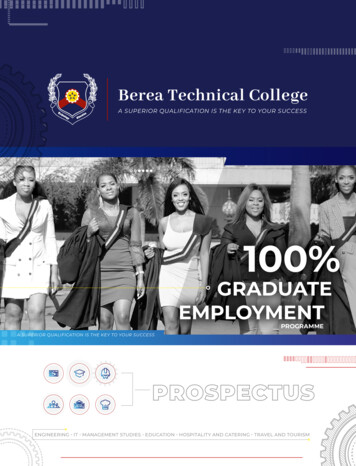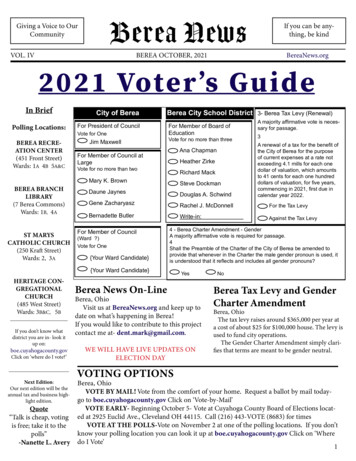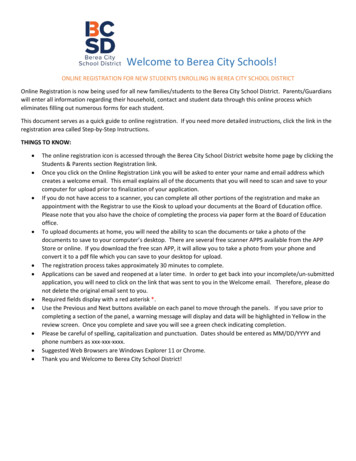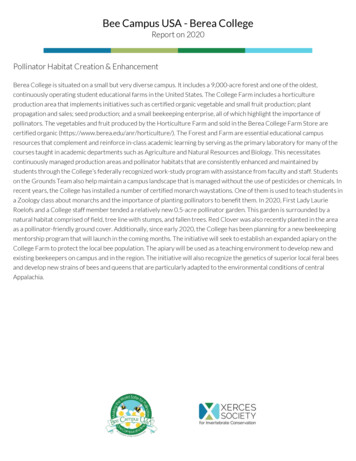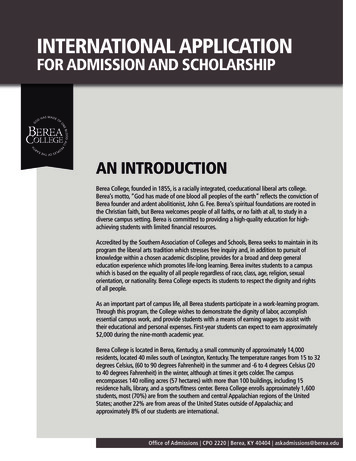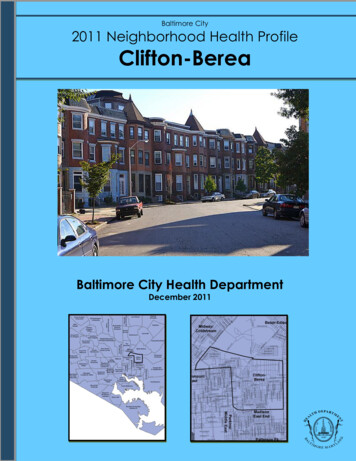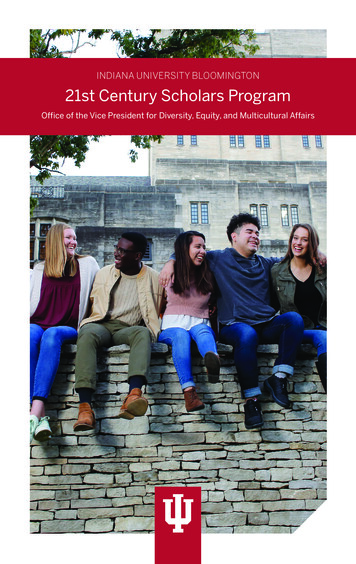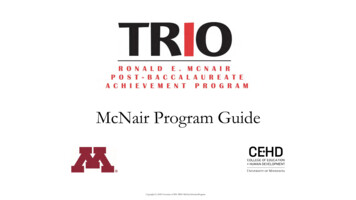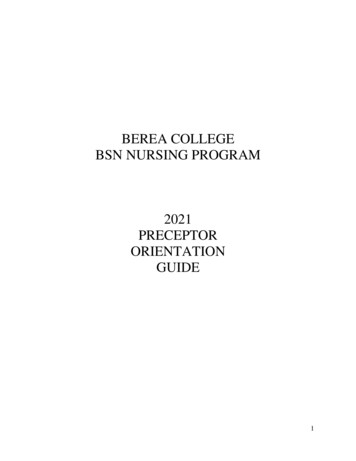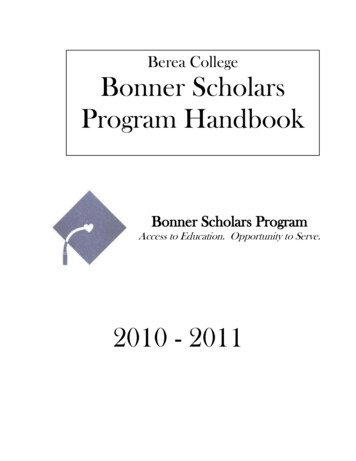
Transcription
Berea CollegeBonner ScholarsProgram HandbookBonner Scholars ProgramAccess to Education. Opportunity to Serve.2010 - 2011
BEREA COLLEGEBonner Scholars Program HandbookTable of ContentsTOPICPAGEBerea College Bonner ScholarsThe Bonner Foundation and the Bonner Scholars Program23Bonner Foundation Mission StatementBonner Foundation Values and BeliefsBonner Foundation HistoryOverview of Bonner Scholars and Bonner Leaders ProgramsBerea College Bonner Scholars Program6About Berea CollegeThe Great Commitments of Berea CollegeService at Berea CollegeCenter for Excellence in Learning Through Service (CELTS)The Bonner Scholars Program at Berea CollegeBonner Scholars Program Common Commitments and Leadership Development11Six Common Commitments5 E’s of Leadership DevelopmentBonner Scholars Program Student Roles, Procedures and Policies13Student LeadershipRecruitment and SelectionReplacement PolicyTransfer Bonner ScholarsBonner Scholar Code of ConductBonner Scholars Program Requirements16Community ServiceOrientationClass MeetingsReflectionFirst Year Week of Service TripSophomore Service ExchangeJunior Recommitment CeremonySenior Bonner Presentation of Learning and Senior Exit InterviewSummer ServiceBonner Web-Based Reporting System (BWBRS)EvaluationsStudent Impact SurveysBonner Scholars Program Resources21Bonner Scholars Community FundBonner CongressRetentionCampus-Wide CollaborationService Opportunities at Berea College22Service Opportunities through CELTSOther Service Opportunities at Berea CollegeService Opportunities in the Berea CommunityBerea College Bonner Scholars Program2010-2011 HandbookUpdated 8.10Page 2
Berea College Bonner ScholarsClass of 2011Ehidiamhen AkhetuamhenTony ChoiKatie FrensleyJames HamblinTaryn HenningSabrine IshimweKaruva KasekePatrick KluesenerChanel MeadowsPhiYen NguyenBrittany StowersJuan TorresJose VictoriaClass of 2012Kevonia AdamsonJessica BrownMatthew CalloJonathan DavisSonja EscamillaJoao Ferreira FilhoMichelle GardnerMarah HolzSeth HutchinsKurstin JonesAna MegrelishviliShaina TheisJustin ThomasRaven WeaverGary ZornesClass of 2013Sarai BaileySeth BaileyRyan FortenberryHannah FranklinKyle HornSarah KozelCorey LewisRosemary MeloneyGrace ParLydia PattonGloria ReinaBianca ScottNichole StettenIvan TitaleyClass of 2014Katie BoydJoel CecilChan ChoiKatie DowneyEthan HamblinDavid KretzmanCorey LoweryJoan ManinangBerea College Bonner Scholars Program2010-2011 HandbookUpdated 8.10Son NghiemMegan OsborneMatthew RibarTaylor RutherfordErica ScottOlivia SpoonerMatthew WalkerPage 3
The Bonner Foundation andthe Bonner Scholars ProgramBonner Foundation Mission StatementThrough sustained partnerships with colleges and congregations, the Corella and Bertram F. BonnerFoundation seeks to improve the lives of individuals and communities by helping meet the basic needsof nutrition and educational opportunity.Bonner Foundation Values and Beliefs The Bonner Foundation is committed to working with all people and institutions regardless ofage, race, belief, or nationality. The Bonner Foundation believes that colleges and congregations have vital roles to play insociety in nurturing and mobilizing thoughtful, caring, and diverse leadership dedicated tocommunity service. The Bonner Foundation recognizes that often the best way to help someone is to give them theopportunity to help themselves, and that the people best able to address a problem are thepeople whom it most directly affects. The Bonner Foundation recognizes that effective community service programs involve allstakeholders in their leadership. The Bonner Foundation recognizes that long-lasting partnerships are based on mutual respectand common commitments. The Bonner Foundation supports innovative programs that have the potential to serve asmodels for the field.Bonner Foundation HistoryThe Founders - Corella and Bertram F. BonnerBertram Bonner was born in Brooklyn, New York in 1899. He was born into poverty and worked hisway through college by taking night classes. At the age of 22 he was named Head Treasurer for HedaGreen Banks in New York City. Eventually, he became involved in real estate in New Jersey, New Yorkand Florida, and had a career that spanned six decades, including building over 30,000 homes andapartments.Corella Allen Bonner was born in Eagan, Tennessee. She spent her young life growing up in coal miningtowns in West Virginia, Kentucky, and Tennessee. At the age of fourteen, she and her mother moved toDetroit where she found work as a cashier. She attended Wayne State University at night and madesure that her younger siblings also went to school, although she never earned a college degree. SheBerea College Bonner Scholars Program2010-2011 HandbookUpdated 8.10Page 4
later transferred to the Statler Hotel in New York City, where she met Bertram Bonner. They weremarried, four years later, in 1942.In 1956 the Bonners moved to Princeton, New Jersey and began a crisis ministry/emergency foodprogram. Their generosity continued with the founding of the Corella and Bertram F. BonnerFoundation, Inc. in 1987. This foundation led to the establishment of the Bonner Scholars Program in1990. Mr. Bonner passed away in 1993, and Mrs. Bonner passed away in July 2002, at the age of 92.Berea College, Home of the First Bonner Scholars ProgramIn the fall of 1990, the Bonner Foundation beganrecognizing college students who demonstratedcommitments to academic success and communityservice. With the assistance of Dr. John B.Stephenson (former President of Berea College)the first Bonner Scholars Program was establishedat Berea College. Berea College was an obviouschoice to pioneer the Bonner Scholars Program,given the College’s history and mission, its alreadyestablished commitment to service, and the priorrelationship between Mr. & Mrs. Bonner, thenBerea College President John B. Stephenson, andformer Bonner Foundation President WayneMeisel.Overview of Bonner Scholars and Bonner Leaders ProgramsThe Program was designed to provide access to higher education and an opportunity for students toserve. In 1992, the Foundation decided to expand, and 12 more schools were invited to participate inthe Bonner Scholars Program. Six years later, Union College became the site of the second BonnerScholars Program in Kentucky. In 2005, Centre College became the third. Two other Kentucky schools Lindsey Wilson College and the University of Louisville - are part of the Bonner Network, as BonnerLeader Schools.The Bonner Scholars Program is based on the premise that young people care about others and giventhe opportunity, will become active and involved in their communities. It is also based on theunderstanding that college students have a unique and important contribution to make to our societyand future.To be eligible for the Bonner Scholars Program, students are required to meet three basicrequirements: an above average academic record, financial need, and demonstration “that he or shehas held a role or roles in service with significant responsibility at home, in church, at school, or in theBerea College Bonner Scholars Program2010-2011 HandbookUpdated 8.10Page 5
community.” Currently active in 24 colleges, most of which lie in the southern Appalachia andPiedmont regions, the Bonner Scholars Program assists students who prefer to spend their out-of-classtime addressing social issues and engaging in community-based learning. In the summer months,through Summer of Service, Bonner Scholars continue their efforts and turn Foundation assistance intothe type of sustained community action not possible during the school year and not feasible withoutfinancial assistance.Nationwide, there are approximately 1500 Bonner Scholars annually.In 1997, the Bonner Foundation began an effort to expand its original model of service-basedscholarships. Today, the Foundation works with more than 60 institutions nation-wide which havebegun chapters of the Bonner Leaders Program. Each of these campuses has a core group of 5-30students who work on issues such as improving educational opportunities and fighting hunger throughcommunity programs that focus on literacy issues, mentoring, and nutrition/anti-hunger initiatives.Bonner Foundation Staff and Contact InformationPresident, Bobby HackettSenior Program Officer, Ariane Hoy(See website for full listing of staff)Bonner website: www.bonner.orgBonner wiki: http://bonnernetwork.pbworks.com/Bonner Foundation contact information:Bonner Foundation10 Mercer StreetPrinceton, NJ 08540609-924-6663609-683-4626 FAXBerea College Bonner Scholars Program2010-2011 HandbookUpdated 8.10Page 6
BEREA COLLEGEBONNER SCHOLARS PROGRAMAbout Berea CollegeBerea College is distinctive among institutions of higher learning. Founded in 1855 as the first interracial andcoeducational college in the South, Berea charges no tuition and admits only academically promising students,primarily from Appalachia, who have limited economic resources. Berea offers rigorous undergraduateacademic programs leading to Bachelor of Arts and Bachelor of Science degrees in 28 fields. All students work atleast 10 hours per week in campus and service jobs in more than 130 departments.The College has an inclusive Christian character, expressed in its motto "God has made of one blood all peoplesof the Earth." Guided by this inclusive Christian message of impartial love, Berea's founders held fast to theirradical vision of a college and a community committed to interracial education, to the Appalachian region, andto the equality of all women and men from all "nations and climes." This scriptural heritage compelled BereaCollege to serve all persons regardless of race, creed, color, gender, or class, and led the College to draw itsstudents from two immediate constituencies: African-American slaves freed by the American Civil War andwhite mountaineers.Today, Berea's primary service region is the Southern Appalachian region, but students come from all states inthe U.S. and in a typical year, from more than 60 other countries representing a rich diversity of cultures andfaiths. About one in three students represents a racial or ethnic minority.Berea continues to build upon a distinctive history of 150 years of learning, labor and service, and find new waysto apply our mission (called the Great Commitments) to contemporary times by promoting kinship among allpeople, serving communities in Appalachia and beyond and living sustainably to conserve limited naturalresources.The Great Commitments of Berea CollegeBerea College commits itself: To provide an educational opportunity primarily for students from Appalachia, blackand white, who have great promise and limited economic resources.To provide an education of high quality with a liberal arts foundation and outlook.To stimulate understanding of the Christian faith and its many expressions and toemphasize the Christian ethic and the motive of service to others.To provide for all students through the labor program experiences for learning andserving in community, and to demonstrate that labor, mental and manual, hasdignity as well as utility.To assert the kinship of all people and to provide interracial education with aparticular emphasis on understanding and equality among blacks and whites.To create a democratic community dedicated to education and equality for womenand men.To maintain a residential campus and to encourage in all members of the communitya way of life characterized by plain living, pride in labor well done, zest for learning,high personal standards, and concern for the welfare of others.To serve the Appalachian region primarily through education but also by otherappropriate services.Berea College Bonner Scholars Program2010-2011 HandbookUpdated 8.10Page 7
Service at Berea CollegeBerea College has a long history of service, reflected in the phrase, “Learning, Labor and Service.”There is a long history of successful outreach programs, of service to the region, of commitment toequality and human dignity, and of community members engaged in compassionate acts towardsothers in and beyond the College itself.In 2000, the Center for Excellence in Learning Through Service (CELTS) was created to house all of thestudent-led service programs, and to lead an initiative to integrate service-learning into the academiccurriculum. This Center, in collaboration with the Appalachian Center and other already existing serviceprograms at the College, has expanded and deepened the commitment to excellence in learningthrough service at Berea College. Today, CELTS is the primary student-based service center at BereaCollege and is home to The Bonner Scholars Program, CELTS Student-led Programs, and the College’sAcademic Service-Learning Program.Center for Excellence in Learning Through Service (CELTS) at Berea CollegeCELTS provides a network of support andresources as well as a common meeting place forstudents, faculty, staff and community partnersinvolved with Berea’s service-related activities.The opportunities for service and service-learningfacilitated by CELTS take place in the immediateBerea/Madison County community, in the largerAppalachian region, and at sites throughout theUnited States and the world. Every Berea Collegestudent, who must be low-income, receives a fulltuition scholarship and holds a ten to fifteen hourper week labor position either on campus or inthe community. Over 80 students each year holdtheir labor position through CELTS, where theycoordinate student-led volunteer programs, helpfacilitate academic service-learning courses, orwork in local non-profit organizations. CELTS andBerea College have been recognized nationally forthe service and service-learning programs.Berea College Bonner Scholars Program2010-2011 HandbookUpdated 8.10Page 8
CELTS VisionWe envision an educational system that successfully combines community service with academiclearning to create an environment that challenges and prepares students to be critical thinkers,reflective learners and active members of just communities, near and far.CELTS MissionThe Center for Excellence in Learning Through Service (CELTS) educates students for leadership inservice and social justice through promotion and coordination of academic service-learning andstudent-led community service.CELTS Administration & Program StaffChad Berry is the Director of CELTS and the Appalachian Center, and Professor of Appalachian Studies.Ashley Cochrane is the Associate Director of CELTS and the Director of the Bonner Scholars Program.She is also the Coordinator of the Service-Learning Program.Heather McNew Schill , ‘99 is the Assistant Director of Community Service and the Coordinator of theBonner Scholars Program.Katie Basham, ’02, is the Coordinator of the First Year Bonner Scholars Program. She also works in theBerea College Campus Christian Center, as the Assistant Director and the Coordinator of InterfaithProgramming.Sheila Lyons, ’86, CELTS Program Associate, provides administrative support to the Bonner ScholarsProgram, including the administration of student payroll.CELTS ProgrammingStudent-Led Service ProgramsCELTS is home to ten student-led service programs which are based on a model of leadershipdevelopment that provides students with opportunities to design and manage programs themselves.Their responsibilities include recruiting and training volunteers, planning and executing weeklyprogram activities, facilitating team meetings and reflections, and mentoring team members. Theseprograms include mentoring and tutoring programs, Habitat for Humanity, an environmental advocacyprogram, and a program that serves the Spanish-speaking community, among others.Bonner Scholars ProgramCELTS is also home to a Bonner Scholars Program, which includes sixty Berea College students whofocus on service activities throughout their undergraduate career. They serve through their laborpositions, and they participate in and lead other service activities such as Summers of Service. As firstyear students, Bonners embark on a journey of personal growth and exploration augmented by astructured program of training, teambuilding, guided reflection, enrichment activities, and experiencesthat remain with them long after their time at Berea has ended.Berea College Bonner Scholars Program2010-2011 HandbookUpdated 8.10Page 9
Service-Learning ProgramThe service-learning program at Berea College provides support for faculty, staff, students, andcommunity partners who are involved in service-learning activities. Today, service-learning courses aretaught in over twenty disciplines across campus. Community partners include non-profit agencies,community organizations, and schools. Service-learning experiences and structured reflection providestudents with the opportunity to make connections between academic course content and communityissues, in the broader context of civic engagement. Service-learning also facilitates the exchange ofideas, knowledge and resources between Berea College and the local community, the Appalachianregion, and beyond.CELTS Focus on HungerBonner Scholars have the opportunity to participate in a seriesof student-led service events that CELTS sponsors each year tohelp address hunger in our community.Hunger Hurts Community Food Drive: Students conduct thisevent during the fall term to collect non-perishable fooddonations from homes throughout the city of Berea. Thesefoods are delivered to - and then sorted and stored at - theBerea Community Food Bank.Hunger and Homelessness Awareness Week: In November, students coordinate a series of educationalevents during National Hunger and Homelessness Awareness Week. These events include an OxfamHunger Banquet and tabling about current legislation related to hunger and homelessness.Empty Bowls: Held during the spring term, students organize the Empty Bowls event, in partnershipwith the Berea College Ceramic Apprenticeship Program, to draw awareness to hunger issues and raisemoney for several local food banks through the sale of tickets for a handmade bowl and a simple meaof soup and bread.Berea College Bonner Scholars Program2010-2011 HandbookUpdated 8.10Page 10
The Bonner Scholars Program at Berea CollegeHistoryWhile Berea College was the first site of a Bonner Scholars Program, it was not always a perfect fit. Inthe first three years the program was subjected to a number of changes from both the College and theFoundation. Negotiating the outcome was not always easy, so for a time it was necessary to considerother options. During the period from 1993 to 1998 Berea College was not involved in the Program,but rejoined in the 1998-99 academic year. Since that time, the Bonner Scholars Program at BereaCollege remains a model for other Bonner Programs because of its structure, its success, and theoutstanding students who represent us. During 1998-99, forty students distributed throughout thefour classes were designated as Bonner Scholars. Four years later that number had grown to sixty.During the 2004-2005 academic year, Berea College was one of four colleges to receive an endowmentfrom The Bonner Foundation. The endowment went into effect beginning with the 2006-2007academic year and effectively guarantees the program’s financial support and, therefore, its existencein perpetuity.Berea College Bonner Scholars Program Opportunities for StudentsThe Bonner Scholars Program offers the following opportunities to students: Labor positions in service beginning with the first year Ongoing leadership training Regional conferences and service events Regular and ongoing enrichment programs, including guest speakers National Bonner Foundation resources Opportunities for extended Summer Service and financial assistance during the service period Connections with students at other Bonner Scholar colleges and Bonner Leader schools.Berea College Bonner Scholars Program Contact InformationThe Bonner Scholars Program and other student-led service programs are housed in The Center for Excellence inLearning Through Service (CELTS) located on the second floor of the Trades Building on the Berea Collegecampus.College Address: CPO 2170 Berea College, Berea, KY 40404General Office Hours: 8:00 a.m. - 5:00 p.m. Monday – Friday or by appointmentMain Office Phone Number: (859) 985-3935Bonner Program Director, Ashley Cochrane: (859) 985-3605Bonner Program Coordinator, Heather Schill: (859) 985-3804Bonner First Year Programs Coordinator, Katie Basham: (859) 985-3953Bonner Senior Intern: (859) 985-3733Berea College Bonner Scholars Program2010-2011 HandbookUpdated 8.10Page 11
Bonner Scholars ProgramCommon Commitments and Leadership DevelopmentSix Common Commitments of Bonner Scholars ProgramsEarly in the Bonner Scholars Program, the Foundation worked with staff and students to develop sixCommon Commitments for the Program. Social JusticeAdvocate for fairness, impartiality and equality while addressing systemic social andenvironmental issues. Civic EngagementParticipate intentionally as a citizen in the democratic process, actively engaging in public policyand direct service. Community BuildingEstablish and sustain a vibrant community of place, personal relationships and commoninterests. Spiritual ExplorationExplore personal beliefs while respecting the spiritual practices of others. International PerspectiveDevelop international understanding that enables Bonner Scholars to participate successfully ina global society. DiversityRespect the many different dimensions of diversity in our public lives.Berea College Bonner Scholars Program2010-2011 HandbookUpdated 8.10Page 12
The 5 E’s of Leadership DevelopmentThe 5 E's are a framework for students' ongoing growth as they develop, apply, and integrate servicepassions, career interests, leadership skills, and academic pursuits. Students move through stages ofincreasing responsibility, skill, and knowledge development, put into practice through service. ExpectationBonner Scholars are selected based on their record of service in their home communities andbegin to learn about the Program as they prepare for College ExplorationDuring the first year, orientations and trainings help Bonners explore their own identity, theirnew community, and a wide range of opportunities for service ExperienceIn the second year, Bonners usually choose a program, site, or issue on which to focus andcontinue to develop more leadership skills ExampleIn the third year, Bonners assume leadership positions in service programs or at communitysites and become mentors to others ExpertiseFourth year Bonners put their highly developed skills and expertise to work in the community,often integrating academic and service interests through community based research, policywork, or leadership roles in the Bonner Program and CELTS.Berea College Bonner Scholars Program2010-2011 HandbookUpdated 8.10Page 13
Bonner Scholars ProgramStudent Roles, Procedures and PoliciesStudent LeadershipBonner Scholars are encouraged to take leadership roles in all aspects of the Program from recruitment tomentoring, training, budgeting, and representing Berea College in the Bonner Scholars Congress. An effort ismade to have representation from each class on the various committees.Senior Intern –The Senior Intern’s main goal is to assist the Bonner Program staff in developing the BonnerScholars Program at each school. The Senior Intern also plans, facilitates, and supervises Bonner meetings,retreats, and trainings, and helps to coordinate the Student Leadership Team. The Senior Intern helps manageand delegate important tasks among Bonner students, including campus-wide or Bonner service events, PreviewWeek-end, First Year Orientation, First Year Service Trip, Second Year Service Exchange, and JuniorRecommitment. The Senior Intern is a member of the CELTS Leadership Team.First Year Coordinators - Each year, three upper level Bonners are selected to serve as team leaders for theincoming class of Bonner Scholars. Their general responsibilities include daily oversight of First Year Bonners intheir Labor positions, supporting, advising, and guiding First Years both as a team and as individuals. They reportto the Bonner staff.Student Advisory Committee (SAC) - This committee consists of two representatives from each class, the BonnerSenior Intern and the Bonner Congress Representatives. This committee will meet regularly with the Bonnerstaff to discuss issues that are important for the development of the Program. Class representatives on thiscommittee are responsible for planning and coordinating their class’s cornerstone activity (First Year ServiceTrip; Sophomore Exchange; Junior Recommitment; Senior Bonner Presentation of Learning and Exit Interview).Community Fund Committee - This committee reviews requests from Bonner Scholars to receive money fromthe Community Fund, a pool equaling 100 for each Bonner Scholar per year, to be used at the discretion of theCommittee for enhancing service activities.Bonner Congress - The Congress is made up of Bonner Scholars with at least one year of Bonner experiencebehind them. This means they are familiar with the Bonner Program and can be a great resource. In general,Bonner Congress Representatives serve at least two years, and often longer. Every school has two CongressReps. Congress Reps share their peers' ideas, new initiatives and projects, and concerns to Bonner Foundation.Likewise, they communicate ideas and concerns from the Bonner Foundation to fellow Bonners at their schools.For instance, Congress Reps participated in voter registration and education training, and started theseinitiatives back on campus.Advisory Board - Two Bonner Scholars will serve as members of the Advisory Board, along with faculty, staff anda community representative. The Advisory Board is involved in the selection process for incoming BonnerScholars.Berea College Bonner Scholars Program2010-2011 HandbookUpdated 8.10Page 14
Recruitment and SelectionBonner Scholars are selected based upon their scholarship, service activities, and financial need. TheProgram is interested in selecting students who have a desire to participate in service work throughouttheir careers at Berea. Information about applying for the Bonner Scholars Program is available to allpotential incoming Berea College students on the Bonner Scholars Program webpage:www.berea.edu/celts/bonnerscholars/ .The Advisory Board selects 25-30 finalists based on the following criteria: Admission to Berea College;Demonstration of significant community service at school, church, or in the home community;Demonstration of a commitment to making connections between service interests and initiativesand academic life.The 25-30 finalists are then invited to Berea’s campus for a Bonner Preview Weekend. During thisweekend, students participate in a wide variety of team building activities and an individual interview.The final 15 Bonner Scholars are then selected from the group of finalists and from internationalstudents who are admitted in the summer months.The Program as a whole must strive to achieve the gender balance that exists at the college and everyattempt must be made to increase the ethnic diversity of the incoming class as compared to thecollege as a whole. Final approval of new Bonner Scholars rests with the Foundation in order to verifythat the criteria have been met.Replacement PolicyFirst and second-year Bonner Scholars who withdraw or are dismissed from the program for anyreason may be replaced. The following restrictions apply: Bonner Scholars may be replaced before the start of their third year. (Occasional exceptions maybe made in individual circumstances, with approval by the Foundation.)Bonner Scholar replacements must be in the same class as the students they are replacing andmust be in good academic standing;Replacements will be chosen from students who have demonstrated a commitment to service atBerea College and have a labor assignment in service;A Change of Status Form for every replacement Bonner Scholar must be submitted and approvedby the Foundation before the semester or summer term payment is made to the college from theFoundation;The same criteria in the selection of replacement students must be adhered to as for incomingBonner Scholars.Berea College Bonner Scholars Program2010-2011 HandbookUpdated 8.10Page 15
Transfer Bonner ScholarsBonner Scholars wishing to transfer to Berea College from another Bonner College must be admitted toBerea College in good academic standing. Additionally, the Scholar must be in good academic standingwith the transferring institution and in good standing with the transferring Bonner Scholars Program.Transfer candidates join the pool with other Bonner Scholar replacement candidates and will gothrough the same selection process; they are not guaranteed a place in the Program.Bonner Scholar Code of ConductEach Bonner Scholar serves as a representative of Berea College, CELTS, and the Bonner ScholarsProgram, and should therefore make responsible decisions at all times. Each Scholar is expected tomaintain a high level of integrity and set an example for their peers and those whom they serve. Theinability to uphold the standards of the Berea College Bonner Scholars Program may result in theScholar’s dismissal from the Program.All students who hold their Labor positions at CELTS, and all Bonner Scholars working on campus or inthe community, are required to sign the CELTS Student Labor Code of Conduct and the CELTS LaborPosition Contract. These documents outline the consequences of any failure to uphold theexpectations of all CELTS student staff and all Bonner Scholars. A Bonner Scholar’s continuation in theprogram may be reviewed by Program staff at any time if expectations are not being met.Berea College Bonner Scholars Program2010-2011 HandbookUpdated 8.10Page 16
Bonner Scholars Program RequirementsCommunity ServiceBonner Scholars are re
service. With the assistance of Dr. John B. Stephenson (former President of Berea College) the first Bonner Scholars Program was established at Berea College. Berea College was an obvious choice to pioneer the Bonner Scholars Program, given the ollege's history and mission, its already established commitment to service, and the prior
